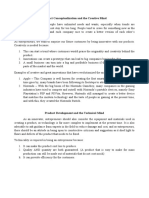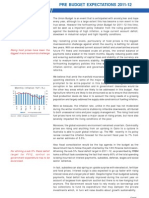Lesson 6 Entrepreneurship
Lesson 6 Entrepreneurship
Uploaded by
Romeo BalingaoCopyright:
Available Formats
Lesson 6 Entrepreneurship
Lesson 6 Entrepreneurship
Uploaded by
Romeo BalingaoOriginal Description:
Copyright
Available Formats
Share this document
Did you find this document useful?
Is this content inappropriate?
Copyright:
Available Formats
Lesson 6 Entrepreneurship
Lesson 6 Entrepreneurship
Uploaded by
Romeo BalingaoCopyright:
Available Formats
75
ENTREPRENEURSHIP
Leonida Polangcos
Myra Lydia Profeta
MOTIVATION
Give at least ten (10) names of Filipino entrepreneurs who become successful
in their respective fields. What do you think are the keys to their success?
Share your answer to the class.
1. ____________________________ 6. _________________________
2. ____________________________ 7. _________________________
3. ____________________________ 8. _________________________
4. ____________________________ 9. _________________________
5. ____________________________ 10. ________________________
DISCUSSIONS
What is Entrepreneurship?
Entrepreneurship is the process of creating something different with
value by devoting the necessary time and effort, assuming the accompanying
financial, psychic, and social risks, and receiving the resulting rewards of
monetary and personal satisfaction. Entrepreneurship also includes the ability
to build an entrepreneurial or venture team to complement your own skills and
talent. To be an entrepreneur you should be able to identify, start, and
maintain viable and profitable business. It is the knack for sensing an
opportunity where others see chaos, contradiction, and compulsion. It
possesses the know-how to find, marshal, and control resources (often owned
by others) which shows that entrepreneurship is somehow a way of life.
OBJECTIVES
Distinguish entrepreneurship from entrepreneurs.
Analyze some Filipino values favourable to entrepreneurship.
Explain ways on how to go into business.
Apply small scale entrepreneurial skills
76
Who is an Entrepreneur?
An entrepreneur is an individual who engages in business; an
innovator of business enterprise who recognizes opportunities to introduce a
new product, a new process or an improved organization, and who raises the
necessary money, assembles the factors for production, and organizes an
operation to exploit the opportunity. An entrepreneur may also refer to a
person who believes and practices the tenets of entrepreneurship and does
actions by himself. An entrepreneur is also someone who starts and runs his
own business rather than remain an employee of someone else's company.
According to Mr. Joey Concepcion, CEO of RFM Corporation, an entrepreneur
always wants to look into new ideas and creates new businesses.
Traits of an Entrepreneur
To be an entrepreneur, you should acquire traits such as:
1. Self-awareness. As an entrepreneur, you should always be aware of
what you want, what is good for you and what business you like to
start based on your expertise.
2. Self-motivation. This is the characteristic that gets you going and
keeps you moving when you are in business for yourself.
3. Courage. Willingness to take risks is a valuable trait when striving for
success. It is also the willingness to take a chance and hope for a
positive response to the request.
4. Confidence. Positive thinking is a major step in the direction of
success. By behaving as if you already are a success at what you do,
it follows that you will be, and your customers will believe it, too.
5. Patience. To own your business, there will be times when you feel
like the roof is craving in, especially when your suppliers seem to be
taking your own sweet time in fulfilling an important order or when a
customers demands seem to be unrealistic.
6. Decisiveness. When a decision has to be made immediately or on the
spur of the moment, you should go with your intuition and trust that you
are doing the right thing.
7. Experience. One reason why some business falls within a few years
of start-up is the owners lack of business experiences. Experience is
directly related to the business you are planning to start. It is key
component for growth.
8. Knowledge. Experience in your field is invaluable, but it is not
enough. You have a better chance of succeeding by knowing.
9. Perseverance. You must be willing to persevere during the rough
times, to hang in there during the slow periods, and to maintain your
belief in your product or service even when it seems like no one else in
77
the world knows you exist.
10. Drive. You must believe in your goal and be determined to succeed.
The successful business person does not view obstacles or stumbling
blocks as problems, but rather as challenges. You need to be totally
committed and willing to work long hours, especially in the beginning.
If you do not have the time or commitment to dedicate your dreams,
then you are better off working for someone else.
Roles of an Entrepreneur
Here are some roles that an entrepreneur like you should perform:
1. Entrepreneurs search for opportunities in the environment. As an
entrepreneur, you should search the market for ideas on what to
produce or sell. You should look at trends, situations, and the needs
and wants of people and use them as an opportunity to create a
business.
2. Entrepreneurs are risk-takers. As an entrepreneur, you should do
your best to make your dreams visible, no matter what happens in the
future. You will do whatever it takes to survive and succeed.
3. Entrepreneurs produce their own capital. As an entrepreneur, you
gamble your own money and property for the sake of your business. If
you lack in funds, you dont easily quit. You look for ways and means
to raise the capital you need.
4. Entrepreneurs innovate. As an entrepreneur, you should be
innovative. You should enhance your products every now and then.
You should also be creative and resourceful for the development of
your own product.
5. Entrepreneurs organize the business. As an entrepreneur, you
should know when, where, how or why you are putting up a business.
Most of the ideas should come easily from the needs and wants of the
customers, and you make those ideas visible in the market with
patience, hard work, and determination.
6. Entrepreneurs are decision-makers. Being a risk-taker, you should
make careful and good decisions towards your businesses. As an
entrepreneur, you should create many alternatives and choose the
best to solve the problems that arise in your business.
7. Entrepreneurs plan ahead. As an entrepreneur, you are considered
to be a super hero. You make impossible things happen. You can plan
ahead and anticipate events in the future, trying to visualize what can
78
possibly happen.
8. Entrepreneurs market products for profit. As an entrepreneur, you
should engage in business for profit. You need to see to it that every
product you sell has a return of capital and a profit. You should
establish relationship with your friends and customers but with
business interest.
Filipino Values Favorable to Entrepreneurship
The value of pakikipagkapwa promotes the ideals of
entrepreneurship. It is shown by treating others as fellow human beings. This
value is very connected with our concept of pagkatao or character. It
encompasses our concern of hiya (loss of face), pakikisama
(togetherness), pakikibagay (adjusting to people).
Pakikipagkapwa favors entrepreneurship because it is against any
form of exploitation against another. The role of entrepreneurship is a
practical translation of ones pakikipagkapwatao, his work is to provide
things and services of value to others; he raises their standards of living and
improves their lives. The entrepreneur that has pakikipagkapwa does not
cheat his customers by overpricing or maligning them; nor cheat the
government by avoiding or evading taxes.
Another Filipino value is lakas ng loob (risk-taking). Individuals
without guts or who shrink before challenges cannot become
entrepreneurs. Entrepreneurships involve some amount of risk-taking
because much of the entrepreneurs decisions and actions are made during
conditions of uncertainty. (Fajardo, 2010).
Forms of Business Organizations
The first thing you need to do when starting a business is to know the kind
of business that you want to organize. Below are the four major forms of
business that you can organize, along with their advantages and
disadvantages.
79
Forms of Business Advantage Disadvantage
1. Sole Proprietorship
A kind of business
organization that it is owned
and managed by one
person
Easy to organize
Low start-up capital
Owner takes all profits
Authority in all decision-
making
Easy to discontinue
Good tax privileges
Unlimited personal
liability
Limited skills and
capabilities
Limited access to
capital
Lack of continuity for
the business
2. Partnership
An association of two or
more business partners
who co-own a business for
the purpose of making a
profit
Easy to establish
Complementary skills
or partners
Division of profits
Large pool of capital
Ability to attract limited
partners
Little government
regulations
Flexibility
Unlimited liability of
at least one partner
Difficulty in disposing
of partnership
interest without
dissolving the
partnership
Lack of continuity
Potential for
personality and
authority conflict
3. Corporation
An artificial being, invisible,
intangible, and existing only
in contemplation of law
Limited liability of the
stockholders
Ability to attract capital
Transferable
ownership
Larger pool of skills,
expertise, and
knowledge
Process of set-up is
complicated
Tendency to
institutionalize a
bureaucracy
Individual
stockholders have
limited influence to
management
4. Cooperative
A duly registered
association of persons, with
a common bond of interest,
who have voluntarily joined
together to achieve lawful
common social or economic
end, making equitable
contributions to the capital
required and accepting a
fair share of the risk and
benefits of the undertaking
in accordance with
universally accepted
cooperative principles
Least likely to be
dissolved
Limited liability
Beneficial to more
people
Tendency for
professional managers
to be employed by
members
Shared control of the
business
Consensual
decision- making
Source: Bureau of Micro, Small and Medium Enterprise Development (DTI)
80
How to Go Into Business
For most of their lives, many people have been working for someone else.
They sometimes start from lower position until they rise to higher or even top
level position. Some become employees all their lives contented with low-
paying jobs. But some people would choose to take the challenge of putting
up their own business to earn more rather than work for others.
Having your own business is not an easy task. There are things to
consider before you start your own business. It includes the motivation and
determining factors that may affect your business - planning, choosing
location, registering your business, and training and hiring personnel.
Requirements of Organizing a Business
After doing your business plan, you cannot just start your business
anywhere. The government requires certain permits and requirements before
your business can fully operate.
Here are the requirements on how to organize your business:
1. Registration of the business name with the Department of Trade and
Industry in the case of a single or sole proprietorship
2. Registration of the articles of incorporation and by-laws with the
Securities and Exchange Commission in the case of partnerships or
corporations
3. Application of necessary permit at the level specific location (e.g. village,
subdivision, or barangay)
4. Filling/Application of municipal or city permits where the base of
operation of the business (e.g. Mayors permit, sanitary permit, building
permit as necessary, etc.
5. Compliance with certain specific permits or clearance is for some
specific agencies of the government before local government units or the
national government agencies can allow the full swing operationalization
of the business (e.g. environmental clearance certificates, etc.)
81
6. Registration with the Bureau of Internal Revenue (BIR) for the Tax
Identification Number (TIN) and other requirements under internal
revenue laws and rules
7. Printing of receipts/invoices of the company (after having applied for a
permit to print receipts with the BIR)
8. Registration of the business organization with the Social Security
System (SSS), Philippine Health Care Corporation, Home Mutual
Development Fund, Inc. (PAG-IBIG Fund), and other government
agencies.
Social Responsibility of Business
Social Responsibility is defined as the obligations of businessmen to
pursue their policies to make those decisions, or to follow those lines of
actions which are desirable in terms of the objectives and values of society.
General Social Responsibility of an Entrepreneur
1. An entrepreneur must sell quality at fair price.
2. An entrepreneur must also be fair with supplies by paying them on time as
agreed upon.
3. An entrepreneur must give reasonable profits to stock holders for their
investment.
4. An entrepreneur must pay the correct amount of taxes to the government.
5. An entrepreneur must promote the welfare of his employees.
6. An entrepreneur must observe business ethics with his fellow
businessmen.
7. An entrepreneur must be responsible to his community in terms of job
creation and environmental conservation
82
ACTIVITY 1.
Finding out Your Entrepreneurial Skills
Find out how good you are as an entrepreneur by answering each question.
1. Do you like engaging in hard work?
(a) yes (b) somewhat (c) no
2. Do you regard yourself as people oriented?
(a) yes (b) somewhat (c) no
3. Do you always set goals?
(a) yes (b) somewhat (c) no
4. How many times do you make new initiatives?
(a) always (b) often (c) once in a while
5. How many times have you seen your judgment turn out to be good?
(a) always (b) often (c) once in a while
6. Do you like to innovate or create new things or ideas?
(a) yes (b)somewhat (c)no
7. Do you consider yourself as a self-confident person?
(a) yes (b) somewhat (c) no
8. How flexible and adaptable are you?
(a) very (b) fairly (c) not really
9. How honest are you?
(a) 100% (b) 90% (c) 80%
10. How deep is your desire to win?
(a) 100% (b) 95% (c) 90%
11. How profit - oriented are you?
(a) 100% (b) 90% (c) 80%
12. How good is your problem-solving skills?
(a) 100% (b) 90% (c) 80%
83
13. Are you a risk-taker?
(a) yes (b) somewhat (c) not really
Tally your answers. Count how many a, b, or c you chose and analyze
your answer accordingly:
If you answered mostly A's: You have excellent entrepreneurial skill
with the best chances of succeeding as fast as possible.
If you answered mostly B's: You have very good entrepreneurial skills
that can be further refined as you set up your own business.
If you answered mostly C's: You have good entrepreneurial skills, but
you may need to bolster your skills in areas where you might be weak.
Source: You Can Be Rich by: David King
ACTIVITY 2.
Making of Dishwashing Liquid
Learning how to make a dishwashing liquid may be a possible source
of income for you. Heres how to do it.
The materials needed are the following:
pail
deeper
recycled mineral bottles
plastic funnel
Ingredients Quantity
Water 3-4 liters (may vary)
Stabilizer 50 ml
Degreaser 50 ml
Anti Bac 50 ml
Essence 25 ml
Bubble Agent 50 ml
84
Salt 500 g
Powder Dishwashing
Detergent
1000 g
Labor Packaging
Procedure:
1. Using the pail, dissolve the powder dishwashing detergent on water
and gently stir continuously in one direction.
2. While stirring, mix the remaining ingredients one at a time.
3. Set aside to clear.
4. When clear, transfer the finish product to the bottles using the deeper
and funnel.
85
TEST Entrepreneurship
Name ________________________________ Major ___________________
Date ____________ Section _____________________ Score ___________
Matching Type. Match Column A with Column B. Write your answers on the
space provided.
COLUMN A COLUMN B
1 Social responsibility A
The process of creating something
different or new and assuming the
risks and rewards.
2 Self-awareness B
Cooperative that promotes thrift and
savings among its members
3 Entrepreneurship C
Observes ethics with his/her fellow
businessmen
4 Entrepreneur D
People who start and run their own
business rather than remain an
employee of someone else's
company.
5 Partnership E
Business with total assets of Php
150,000 and below
6
Consumers
cooperative
F
Any business activity or enterprise
engaged in industry, agri-business and
or services
7 Credit cooperative G The willingness to take risks
8 Innovation H To know who you are
9 Medium Business I
Business with total assets of Php 15
million to 60 million
10 Sole Proprietorship J Business own by two or more people
11 Business K
Occupation, work, or trade in which a
person is engaged with
12
Small and Medium
Enterprises
L Business owned by one person
13 Micro Business M Introduce new creation
14 Corporation N
Business owned by 5 or more
business men
15 Courage O
Cooperative for the primary purpose of
procuring commodities in bulk and
86
retails
Enumeration: Supply the correct answers to the following:
A. (4) Forms of Business Organizations
B. (6) Roles of an entrepreneur
C. (5) General Social Responsibility of an entrepreneur
87
BIBLIOGRAPHY
Bureau of Small and Medium Enterprise Development, DTI Do You Want to
Go Into Business? Makati 2006
Fajardo, Feliciano Entrepreneurship, National Bookstore Valenzuela
Philippines, 1994
King, David, You Can be Rich, Worldlink Books. 2002
Glossary of Business and Concepts for Micro, Small and Medium Enterprise,
Bureau of Small and Medium Enterprise Development, Makati
Philippines, 2006
Go, Josiah, Fundamentals of Marketing in the Philippine Setting, Design Plus
2001
Small Enterprises Research and Development Foundation and Up Institute for
Small Scale Industries, Introduction to Entrepreneurship Small
Enterprise Research and Development Foundation Inc. 1997
Concepcion, Joey, Go Negosyo ABS-CBN Publishing, 2006
You might also like
- CXC Accounts NotesDocument60 pagesCXC Accounts NotesNadira Seecharan100% (3)
- AA025 PYQ 2015 - 2014 (ANS) by SectionDocument4 pagesAA025 PYQ 2015 - 2014 (ANS) by Sectionnurauniatiqah49No ratings yet
- Receiptsreceipts 04032011 25203Document1 pageReceiptsreceipts 04032011 25203Deepak KumarNo ratings yet
- Enterpreneurship LessonDocument26 pagesEnterpreneurship LessonMorelei Fernandez100% (1)
- Opportunity Seeking, Screening, and SeizingDocument19 pagesOpportunity Seeking, Screening, and SeizingElsie Alcover Relacion0% (1)
- Introduction To EntrepreneurshipDocument42 pagesIntroduction To EntrepreneurshipJanel Rhoan HermidillaNo ratings yet
- ECC 4 Module 2Document5 pagesECC 4 Module 2Trixie Mendoza Torres100% (2)
- The Environment of The Entrepreneurial VentureDocument34 pagesThe Environment of The Entrepreneurial VentureAleena Cornell SaliganNo ratings yet
- 15 CMO 25 s2015 Revised PSGs For BSCS BSIS and BSIT ProgramsDocument57 pages15 CMO 25 s2015 Revised PSGs For BSCS BSIS and BSIT ProgramsMiguel Conrado Godinez Catacutan88% (16)
- Electronicboards - Q Management Accounting FunctionsDocument2 pagesElectronicboards - Q Management Accounting FunctionsBhavik Thakkar0% (1)
- Prelim AFAR 1Document6 pagesPrelim AFAR 1Chris Phil Dee75% (4)
- Audit Quiz 2Document4 pagesAudit Quiz 2Amir LM67% (3)
- Entrepreneurship - PPTX Version 1 - Copy (Autosaved) (Autosaved) (Autosaved) (Autosaved)Document211 pagesEntrepreneurship - PPTX Version 1 - Copy (Autosaved) (Autosaved) (Autosaved) (Autosaved)Leona Alicpala67% (3)
- ConceptualizingDocument8 pagesConceptualizingHyacinth'Faith Espesor IIINo ratings yet
- Lesson 7 - SORCES OF ENTRE IDEASDocument23 pagesLesson 7 - SORCES OF ENTRE IDEASTeacher FloNo ratings yet
- Recognize A Potential MarketDocument18 pagesRecognize A Potential MarketEmyren ApuyaNo ratings yet
- L2 Opportunity Seeking Screening and SeizingDocument17 pagesL2 Opportunity Seeking Screening and Seizingcharlie besabellaNo ratings yet
- Module 2 - EntrepreneurshipDocument10 pagesModule 2 - EntrepreneurshipLord GrimNo ratings yet
- Entrepreneurship WEEK3Document28 pagesEntrepreneurship WEEK3marjun catan100% (1)
- SHS - SLK - Entrepreneurship Marketing MixDocument20 pagesSHS - SLK - Entrepreneurship Marketing MixiammhonNo ratings yet
- Recognize and Understand The MarketDocument21 pagesRecognize and Understand The MarketBelen GonzalesNo ratings yet
- SHS - ABM - G12 - Q1 - M2 - ENTREP - Job Opportunities - FINALDocument25 pagesSHS - ABM - G12 - Q1 - M2 - ENTREP - Job Opportunities - FINALChiara Cristi100% (1)
- Entrepreneurship ModuleDocument28 pagesEntrepreneurship ModuleHart Franada100% (1)
- MODULE 1 5 Entrepreneurship - Docx 1Document74 pagesMODULE 1 5 Entrepreneurship - Docx 1MARY JUDIELL VILLANUEVA100% (1)
- Entrep - Unit 1 - Lesson 1 PDFDocument25 pagesEntrep - Unit 1 - Lesson 1 PDFJulia Renee PANLILIO IGNACIONo ratings yet
- Liberty Commercial CenterDocument3 pagesLiberty Commercial CenterZie BeaNo ratings yet
- Entrep ModuleDocument13 pagesEntrep ModuleJay JovenNo ratings yet
- Assessment (W-4) : DIRECTION: Read The Statement With Understanding. Encircle The Letter of The Correct AnswerDocument2 pagesAssessment (W-4) : DIRECTION: Read The Statement With Understanding. Encircle The Letter of The Correct AnswerVillanueva AyumiNo ratings yet
- Entrep 6Document5 pagesEntrep 6Aliah Bianca SolisNo ratings yet
- Module 4 EntrepDocument8 pagesModule 4 EntrepNina Angela AsentistaNo ratings yet
- EntrepreneurshipDocument2 pagesEntrepreneurshipIrish Barcelon100% (1)
- Entrep12 L5 - L6Document6 pagesEntrep12 L5 - L6Jerwin SamsonNo ratings yet
- Lesson 5 - Screen The Proposed Solution - S Based On Viability, Profitability, and Customer RequirementsDocument1 pageLesson 5 - Screen The Proposed Solution - S Based On Viability, Profitability, and Customer RequirementsJoemerson GuiwanNo ratings yet
- Entrep W2SSLM2Document6 pagesEntrep W2SSLM2Shaina jane UyNo ratings yet
- Lesson 4 - Opportunity ScreeningDocument33 pagesLesson 4 - Opportunity Screeningjared catanguiNo ratings yet
- Unit 1-Lesson 4 - Market Need AnalysisDocument9 pagesUnit 1-Lesson 4 - Market Need AnalysisMarra Kathleen AyaayNo ratings yet
- Entrepreneurship 12 Final PDFDocument47 pagesEntrepreneurship 12 Final PDFMarilou SacayanNo ratings yet
- Introduction To Business Implementation 1Document23 pagesIntroduction To Business Implementation 1Jeian Abigail0% (1)
- CHAPTER 3 - Business PlanDocument75 pagesCHAPTER 3 - Business PlanMohd Faiz Ash Burn100% (5)
- Business Plan Example - WordToPdfDocument33 pagesBusiness Plan Example - WordToPdfCalvin LabialNo ratings yet
- Module 1 EntrepreneurshipDocument27 pagesModule 1 EntrepreneurshipGabby Jimenez100% (3)
- Product Proposal RubricsDocument1 pageProduct Proposal RubricsBernadette SungaNo ratings yet
- Module 2. EntrepreneurialDocument45 pagesModule 2. EntrepreneurialLeigh Shane80% (5)
- Opportunity ScreeningDocument25 pagesOpportunity ScreeningStephanie Biyo83% (6)
- Module 1 - (2) Common and Core CompetenciesDocument22 pagesModule 1 - (2) Common and Core CompetenciesnissamagbagoNo ratings yet
- Importance of EntrepreneurshipDocument37 pagesImportance of EntrepreneurshipBarsiliza Creus0% (1)
- Chapter 1 Business PlanDocument11 pagesChapter 1 Business PlanCaironisah Mocadi HmdNo ratings yet
- 1.1 Pros and Cons of Entrepreneurship VsDocument14 pages1.1 Pros and Cons of Entrepreneurship VsJef GalinganNo ratings yet
- 2-The Philippine EconomyDocument24 pages2-The Philippine EconomyWilsonNo ratings yet
- Product Conceptualization and The Creative MindDocument1 pageProduct Conceptualization and The Creative MindWalter OrpillaNo ratings yet
- Entrep Module 2Document9 pagesEntrep Module 2JOHN PAUL LAGAO100% (1)
- Department of Education: Republic of The PhilippinesDocument8 pagesDepartment of Education: Republic of The PhilippinesErlieNo ratings yet
- Entrep Lesson1Document91 pagesEntrep Lesson1Teacher Anne ApolinarioNo ratings yet
- W5 Opportunity-ScreeningDocument44 pagesW5 Opportunity-ScreeningJenifer ChoNo ratings yet
- Entrepreneurship ReviewerDocument4 pagesEntrepreneurship ReviewerKent Ronnel Ranque PilarNo ratings yet
- Opportunity ScanningDocument12 pagesOpportunity ScanningNaresh singhNo ratings yet
- Analyze The Market NeedDocument27 pagesAnalyze The Market NeedIvy GonzalesNo ratings yet
- Lesson 2 - Generating Ideas - Harnessing Logic and Creativity p.1Document15 pagesLesson 2 - Generating Ideas - Harnessing Logic and Creativity p.1Michelle Rotairo67% (3)
- Week 2 Entrep ModuleDocument14 pagesWeek 2 Entrep ModuleSuperHero ForFun67% (3)
- Entrepreneurship Module 1 Week 3 & 4Document10 pagesEntrepreneurship Module 1 Week 3 & 4Alma A CernaNo ratings yet
- The 4Ms of Operations Report EntrepDocument45 pagesThe 4Ms of Operations Report EntrepEdlyn joy Baniqued100% (2)
- Lesson 3 OPPORTUNITY SEEKING P1Document21 pagesLesson 3 OPPORTUNITY SEEKING P1Hazel mae Kapangyarihan100% (2)
- Business Enterprise Simulation q4 Module 9Document24 pagesBusiness Enterprise Simulation q4 Module 9cigfreudezekielmesa18No ratings yet
- Entrep Q4 - Module 7Document5 pagesEntrep Q4 - Module 7Paula DT PelitoNo ratings yet
- LOCATION: Sto. Nino, Gapan City, Nueva Ecija Email: CONTACT NO: 426-4729-734 (0907-622-7781)Document23 pagesLOCATION: Sto. Nino, Gapan City, Nueva Ecija Email: CONTACT NO: 426-4729-734 (0907-622-7781)Marinella Joyce DaclesNo ratings yet
- 3 Clusters of PecsDocument2 pages3 Clusters of PecsCRISTINA ESPERANZANo ratings yet
- Bes F1Document33 pagesBes F1Pro NdebeleNo ratings yet
- Alternative Online Platform For Blended LearningDocument7 pagesAlternative Online Platform For Blended LearningRomeo BalingaoNo ratings yet
- C# Save Read ImageDocument1 pageC# Save Read ImageRomeo BalingaoNo ratings yet
- Defense Mechanism TONIO GROUPDocument18 pagesDefense Mechanism TONIO GROUPRomeo BalingaoNo ratings yet
- Chapter 1. What Is Project-Based Multimedia Learning?Document7 pagesChapter 1. What Is Project-Based Multimedia Learning?Romeo Balingao100% (1)
- Effectiveness of Google Classroom Teache PDFDocument15 pagesEffectiveness of Google Classroom Teache PDFRomeo BalingaoNo ratings yet
- Components of A Learning ModuleDocument1 pageComponents of A Learning ModuleRomeo BalingaoNo ratings yet
- Alternative Online Platform For Blended LearningDocument4 pagesAlternative Online Platform For Blended LearningRomeo BalingaoNo ratings yet
- Effectiveness of Google Classroom Teache PDFDocument15 pagesEffectiveness of Google Classroom Teache PDFRomeo BalingaoNo ratings yet
- 133.00 One Hundred Thirty Three Dollars and No Cents 11.00 #NAME? 121,212,323.00 #NAME? #NAME? #NAME? #NAME? #NAME? #NAME? #NAME? #NAME? #NAME? #NAME? #NAME? #NAME? #NAME? #NAME? #NAME? #NAME?Document1 page133.00 One Hundred Thirty Three Dollars and No Cents 11.00 #NAME? 121,212,323.00 #NAME? #NAME? #NAME? #NAME? #NAME? #NAME? #NAME? #NAME? #NAME? #NAME? #NAME? #NAME? #NAME? #NAME? #NAME? #NAME?Romeo BalingaoNo ratings yet
- For KIOSK (Student Respondents) : WITH SMS NOTIFICATION in Terms of Functionality, Efficiency, Usability, Reliability, andDocument2 pagesFor KIOSK (Student Respondents) : WITH SMS NOTIFICATION in Terms of Functionality, Efficiency, Usability, Reliability, andRomeo BalingaoNo ratings yet
- Our Lady of The Pillar College-San Manuel Incorporated: Appendix A QuestionnaireDocument1 pageOur Lady of The Pillar College-San Manuel Incorporated: Appendix A QuestionnaireRomeo BalingaoNo ratings yet
- Organizational Chart 2019Document1 pageOrganizational Chart 2019Romeo BalingaoNo ratings yet
- Letter For The Head of The School: Appendix BDocument1 pageLetter For The Head of The School: Appendix BRomeo BalingaoNo ratings yet
- Click Here To Create & Manage Your Bill of Ladings in SmartsheetDocument1 pageClick Here To Create & Manage Your Bill of Ladings in SmartsheetRomeo BalingaoNo ratings yet
- Click Here To Create & Manage Your Payment Schedule in SmartsheetDocument6 pagesClick Here To Create & Manage Your Payment Schedule in SmartsheetRomeo BalingaoNo ratings yet
- Satisfaction Survey Questionnaire 1Document4 pagesSatisfaction Survey Questionnaire 1Romeo BalingaoNo ratings yet
- #Include #Include #Include Using Namespace Int: Declaring FunctionsDocument2 pages#Include #Include #Include Using Namespace Int: Declaring FunctionsRomeo BalingaoNo ratings yet
- Lesson IV. Music Presentation By: Shiela Mae F. Cabusao Anne Dominique M. Ventura Francis Michael C. Tejero Amparo C. Uy What Is Music?Document2 pagesLesson IV. Music Presentation By: Shiela Mae F. Cabusao Anne Dominique M. Ventura Francis Michael C. Tejero Amparo C. Uy What Is Music?Romeo BalingaoNo ratings yet
- Statement: Click Here To Create & Manage Your Billing Statements in SmartsheetDocument1 pageStatement: Click Here To Create & Manage Your Billing Statements in SmartsheetRomeo BalingaoNo ratings yet
- Sample Chapter 3Document12 pagesSample Chapter 3Romeo BalingaoNo ratings yet
- CFP NanamanDocument1 pageCFP NanamanRomeo BalingaoNo ratings yet
- Performance Task 2Document37 pagesPerformance Task 2Romeo BalingaoNo ratings yet
- Contextualized Online Search and Research SkillsDocument1 pageContextualized Online Search and Research SkillsRomeo BalingaoNo ratings yet
- Respondent: STUDENT Functionality Criteria Average EquivalentDocument4 pagesRespondent: STUDENT Functionality Criteria Average EquivalentRomeo BalingaoNo ratings yet
- Guide Notes On Local Government TaxationDocument36 pagesGuide Notes On Local Government TaxationAlexine Ali BangcolaNo ratings yet
- Habtamu LashetewDocument79 pagesHabtamu LashetewDejeneNo ratings yet
- F 941Document4 pagesF 941anon-125390No ratings yet
- Credit Appraisal For Term Loan And: Working Capital FinancingDocument93 pagesCredit Appraisal For Term Loan And: Working Capital FinancingRohit AggarwalNo ratings yet
- Bond Valuation ModuleDocument13 pagesBond Valuation Moduleashok_rambhiaNo ratings yet
- 0438Document9 pages0438Ahmed BilalNo ratings yet
- IN RE JOHN WILLIAM BARTLE - Document No. 163Document3 pagesIN RE JOHN WILLIAM BARTLE - Document No. 163Justia.comNo ratings yet
- Final Report Highway Toll Study - 1997Document175 pagesFinal Report Highway Toll Study - 1997Welly Pradipta bin MaryulisNo ratings yet
- PreBudgetExpectations2011-12 Anagram 180211Document18 pagesPreBudgetExpectations2011-12 Anagram 180211chaterji_aNo ratings yet
- Trian 13D Presentation DupontDocument12 pagesTrian 13D Presentation DupontCanadianValueNo ratings yet
- Assessment of AOP and BOIDocument28 pagesAssessment of AOP and BOIVishal TanwarNo ratings yet
- Future Goals of BATADocument12 pagesFuture Goals of BATAKausherNo ratings yet
- Presentation of Financial Statement Income StatementDocument5 pagesPresentation of Financial Statement Income Statementgerald almencionNo ratings yet
- 21p 4solDocument3 pages21p 4solrimasinghaniNo ratings yet
- 07 Objective Type IAS 7 Statement of Cash Flows A35Document9 pages07 Objective Type IAS 7 Statement of Cash Flows A35Haris IshaqNo ratings yet
- Module 2 Accounting For Service Business PDFDocument20 pagesModule 2 Accounting For Service Business PDFKem Paulo Que67% (3)
- 23 12 11 Yanzhou Coal NomuraDocument14 pages23 12 11 Yanzhou Coal NomuraMichael BauermNo ratings yet
- SRSDocument4 pagesSRSpradipdudhatNo ratings yet
- Case Digest: Parcero V. Primetown Property Group Inc.: You Are HereDocument2 pagesCase Digest: Parcero V. Primetown Property Group Inc.: You Are HereDah Rin CavanNo ratings yet
- Case Digest Pagcor Vs BIRDocument2 pagesCase Digest Pagcor Vs BIRrbv005100% (3)
- H G Infra Engineering LTD: Subscribe For Long Term Price Band: INR 263 - 270Document8 pagesH G Infra Engineering LTD: Subscribe For Long Term Price Band: INR 263 - 270SachinShingoteNo ratings yet
- Lecture Slides After-Tax AnalysisDocument13 pagesLecture Slides After-Tax AnalysisfathimashariffdeenNo ratings yet
- Accountant Job DiscriptionDocument2 pagesAccountant Job DiscriptionmohandNo ratings yet
- Lease Agreement Adithya GiridharDocument3 pagesLease Agreement Adithya GiridharKarthikeyan PalaniNo ratings yet

















































































































